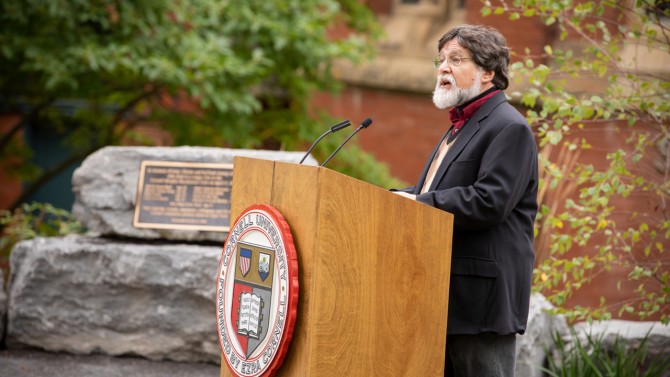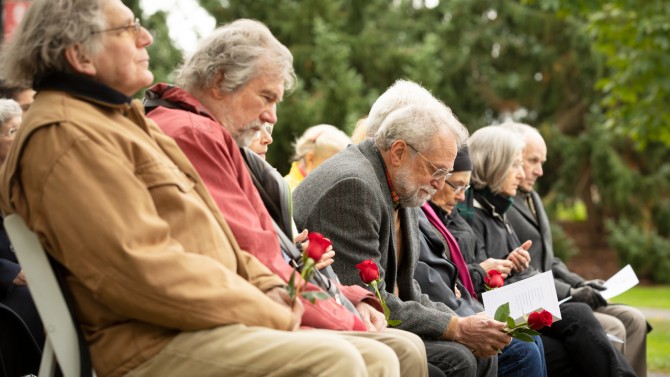
The memorial to the victims of a 1967 fire lies in the heart of campus, between Sage Chapel and Day Hall.
Cornell dedicates memorial to nine lost in 1967 fire
By Krishna Ramanujan
At about 4 a.m. on April 5, 1967, tragedy struck the Cornell community when eight students and a young professor died in a fire at the off-campus Cornell Heights Residential Club.
More than five decades later, survivors, victims’ family members, friends, university officials and others gathered Oct. 4 on the grounds between Day Hall and Sage Chapel to dedicate a new memorial to those who perished in the fire and to remember their lives.
“Here, right in the heart of campus … is an oasis for peaceful remembrance, where the memory of these nine Cornellians will endure,” said Joel Malina, vice president for university relations, who hosted the ceremony.
The memorial – comprising nine boulders of local limestone from around Beebe Lake, a bronze plaque, and plantings including river birch, shrubs and spring flowering bulbs – was designed and created by a student, a professor of landscape architecture, university architects and members of the grounds crew.
At the dedication, Cornell President Martha E. Pollack recounted the words of Holocaust survivor and Nobel laureate Elie Wiesel, who said the way to remember victims and survivors of such calamities was to listen to and retell their stories.
Pollack addressed the victims’ family members and friends, and the survivors: “All of you have felt unheard and your memories unacknowledged. No one can take away the pain of what you experienced. But what we can do is hear your stories and become the custodian of your memories with this memorial, which will remain in the heart of campus for as long as the university stands.”
At the time of the fire, the Cornell Heights Residential Club housed some 50 gifted students who were enrolled in an experimental, accelerated six-year Ph.D. program. Two dozen female seniors and graduate students lived on the second floor. Three faculty counselors, a student adviser and a cook also lived in the building.
Paul Mermin ’70, a member of the six-year Ph.D. program, recounted that fateful night in 1967, and recalled stories of three of his fellow Ph.D. students and of John Finch, a 37-year-old Cornell associate professor of English and a faculty adviser for the Ph.D. program, who initially escaped the fire but ran back in to save others.
Mermin remembered Jeff Smith, “already a mathematician at 16 … shy, genial, self-contained but making overtures to others”; Peter Cooch, who ”could have done about anything” and was “gifted in languages and instantly likable”; Martha “Marti” Beck who was “clearly on her way to great things as a scientist” and “would have become an inspiration and a role model to generations of women in science”; and Finch, a “soft, understated man” who “died literally caring for students.”
Sherry Carr ’67, M.A. ’70, who lived on the second floor of the residential club, took to the podium and spoke of four women who had lived upstairs. Carr’s roommate, Anne McCormic, “was 4 feet 10, … full of energy, a real dynamo… and she’d help a friend without being asked”; Johanna Wallden, from Finland, was “just a lovely person”; Carol Lynn Kurtz was “serious, dedicated … a quiet person, but very determined”; Meimei Cheng was shy, and studied science, German and four dialects of Chinese.
Pollack spoke of Jennie Sun, a junior math major, born in China and raised in Philadelphia, who planned “to work in computers after graduating from Cornell.”
Both Mermin and Carr mentioned survivors and victims’ family members feeling neglected by the university in the past, and a sense of amends being made with this memorial.
“Cornell has done a handsome thing, and we are truly grateful,” Mermin said, adding that “until now these deaths and the fire that caused them have been nearly absent from official histories of the university.” He said he hoped the memorial would serve as an inspiring reminder to the community of the lives that were lost and a call to the Cornell institution to remember their responsibilities to those in their care.
Carr said she thought the victims themselves would have been moved by memorial created in their honor.
“I really think it would have touched their hearts,” she said. She thanked the current administration for its efforts to meet with and listen to survivors and victims’ relatives, for consulting them to create the memorial, and for giving it a prominent place on campus.
“We, the entire Cornell community, now have this excellent memorial,” Carr said. “It’s long overdue, and I’m glad I have lived long enough to see it happen.”
Victims’ family, friends and survivors each placed a rose on the stone memorial, one for each victim. David Zhang ’21 played selections from Bach, Chopin, Giazotto and Vivaldi on violin.
Media Contact
Get Cornell news delivered right to your inbox.
Subscribe


